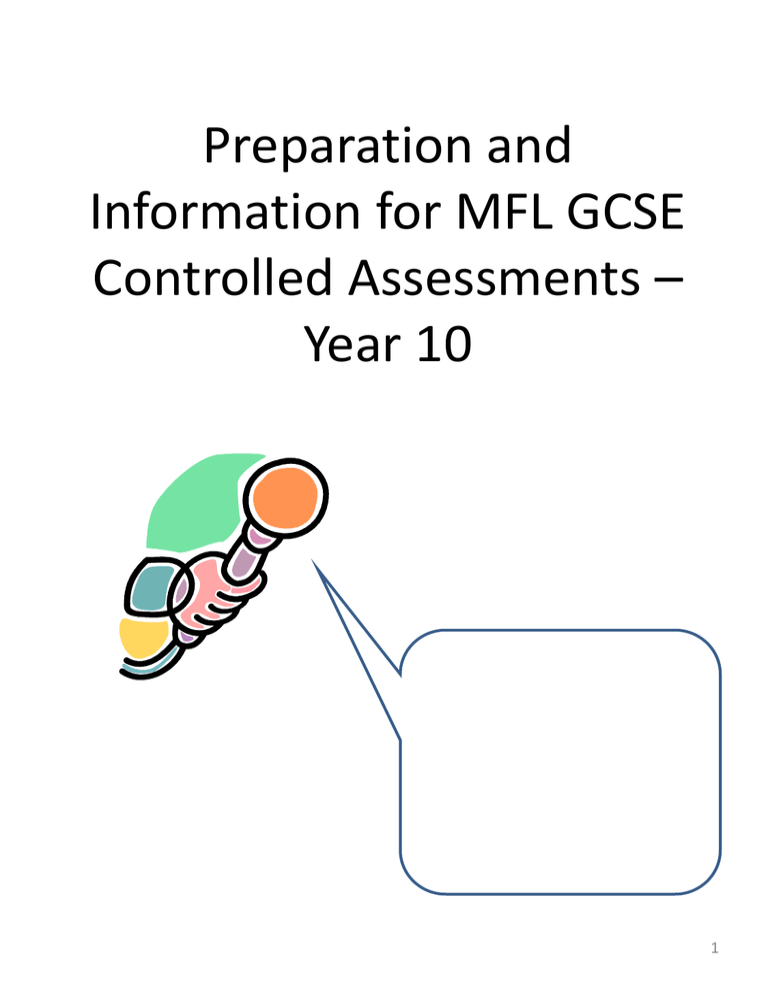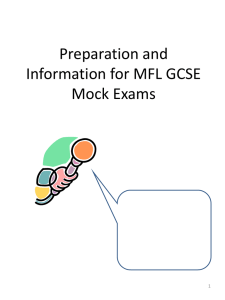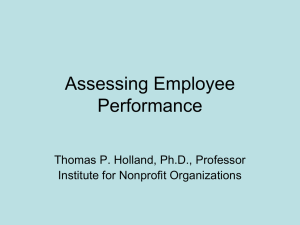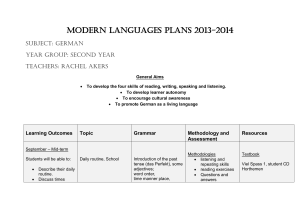GCSE Languages Preparations Booklet
advertisement

Preparation and Information for MFL GCSE Controlled Assessments – Year 10 Name:_________ Tutor Group:_____ Teacher:________ 1 Controlled Assessment Dates • • • • • • Dec 2012 – Yr 10 writing 1 Mar 2013 - Yr 10 writing 2 Jun 2013 – Yr 10 speaking 1 Oct 2013- Yr 11 speaking 2 Dec 2013- Yr 11 writing 3 Mar 2013- Yr 11 speaking 3 • Please note that these dates are provisional and may vary slightly – you will be informed of any changes made. • You will receive a hard copy and a digital copy of each task 2 weeks before the date of the assessment. 2 Frequently Asked Questions • What do I need to do for a controlled assessment? A: You will need to prepare materials for the assessment with your teacher. Think first about the questions you could be asked, prepare to answer them and (for speaking assessments) think of a few questions you could ask too. • How long do I need to speak for / write for? A: The whole speaking assessment will last 4-6 minutes – remember to ask 2 questions. If it is a writing assessment you will have 1 hour to write a minimum of 200 words. • Am I allowed to bring any notes into the exam? A: Yes. You are allowed up to 30 words and 5 pictures. You are not allowed whole sentences but you can use verb forms. The notes can be in the foreign language or English. These notes must be on the Exam Board paper (see example) • What happens if I am ill on the day of the exam? A: Get a message to your teacher straightaway. The assessment can then be done but within one week of the date set. • Do the controlled assessments count towards my final grade? A: Yes! The controlled assessment elements of your GCSE is worth 60% of the overall grade. This is made up of two separate speaking exams and two separate writing assessments, so each is worth 15%. The remainder is made up of 20% reading and 20% listening in the final exams at the end of Year 11. 3 Frequently Asked Questions • Can I get any help with the exam? A: After the task has been set your teacher is only able to give very general feedback. He/She cannot, for example, correct anything in your preparation or tell you how to say something. You must use the work from class, a dictionary (but carefully) and any reference materials to prepare. You are not allowed to use the Internet to prepare. • Can I prepare for the questions I will get? A: Yes! You should brainstorm all your information on the topic, imagining the questions that you could be asked. When you prepare, remember to make use of variety of vocabulary and structures. It is important to make sure, for example, you have used the past, present and future tenses. • What are the examiners looking for? A: They will be looking for: a variety of vocabulary; accuracy; logical, linked ideas; for speaking: good pronunciation; evidence of planning and fluency (meaning not stumbling and slowly delivered). Of course there might be a few pauses while you consider your answers as you have not memorised a script! It is a real conversation and will sound like that too! • Can I speak/write in English at all? A: No! If you don’t know a word or cannot remember a word you need to either think of something else or try and re-word it. You cannot ask the teacher to provide you with a word. If you don’t understand a question, you could say so in the foreign language or you could ask for it to be repeated. • Can I ask my teacher anything in the oral exam? A: Yes. You MUST ask at least one but you could ask more than this. It would be a good idea to prepare to ask 3 or 4 questions. 4 How to Prepare? You may find it easiest to consider the preparation for this in 5 distinct stages: 1) Read the stimulus carefully. Imagine the conversation / composition, writing down all the possible questions that you think you might be asked or you may need to cover. Write these in the foreign language too for oral assessments – remember that’s how you will hear them. 2) Prepare how to answer the questions you have thought of. Look through your notes and mark any useful work you could use such as written work, reading texts etc. You may find it useful to use a highlighter or Post It notes. This stage may take quite a while. It is not wasted time though. 3) Write your answers, taking the time to check spellings and accuracy. For oral assessments, make sure you use words you know how to pronounce and decide on some questions that you can ask during the conversation too. 4) Practise, practise, practise! For oral assessments record yourself asking each question and practise responding to it without notes. For writing, practise writing the text out in full without notes. Note what is easy to remember and what is harder. In this practice stage, ask someone else to practise with you! 5) Create your notes page . Think about what is going to be most useful to you. I always recommend key words that jog your memory about what the sentence is about. It would be 5a good idea to do this in pencil in case you make changes. Tips for Success 1. Start preparing for this as early as possible! You really cannot prepare for this exam the night or even few days before. 2. Don’t plan it all out in English, word for word. You cannot speak fluently in the foreign language so if you try and simply translate you will soon find it a) takes you forever to write your preparation material and b) it will be full of mistakes of grammatical structures you do not yet know. Instead, you should use your exercise book, reference materials and a dictionary (but sparingly and carefully). 3. Be realistic. If you find things like this hard aim to prepare enough material to speak for a maximum of 2 minutes or write the minimum of 200 words and keep the language simple. If you are aiming for an A grade though, you will need to make sure you include some ‘juicy’ language and grammatical structures but you should still not pretend to be a fluent speaker. 4. You may find it useful to record your preparation and listen to it again and again. If you would like to do this, speak to your teacher about how you could do it and make sure you bring a memory stick so you can save it. Then you can easily listen to it again and again (and again and again!) 6 Internet Links 1. Below are some internet sites that are useful to help you prepare. Aim to use these sites regularly to keep on top of vocabulary and structures – remember a little but often! • www.linguascope.com • User: hinchbk • Pass: student • Intermediate • http://www.bbc.co.uk/schools/gcsebitesize/ • www.languagesonline.org.uk • www.yjc.org.uk (for Spanish and German only) 7 Below are a selection of websites you might like to use when learning languages. They are all free and provide some extra support to your classroom learning. NEVER use ONLINE translators as they do not HELP, nor do they give the right information generally. Other ideas to support your vocabulary learning may be to: •Make small vocab cards with the English on one side and the foreign language on the other and put these in a shoe box or bag, so that you always have them. •Put post-it notes on your mirror and take them off when you’ve learnt them. •Make a vocab tree and hang the words on it once you know them. •Get someone at home to test you by saying the English and you spell and pronounce the German/French/Spanish. You can make cartoons / interesting things www.dvolver.com www.goanimate.com www.toondoo.com www.wordle.com www.imagechef.com www.voki.com 8 General Websites (all years) Linguascope (subscription paid by school) www.linguascope.com (hinchbk/pupil) UK German Connection www.ukgermanconnection.org Goethe Institute London www.goethe.de/london German Embassy www.london.diplo.de Hello Mylo (all languages) www.hellomylo.com Languages Online (all languages) www.languagesonline.org.uk BBC (all languages) www.bbc.co.uk/languages BBC Class clips (all languages) www.bbc.co.uk/learningzone/clip s Deutsch Welle - German News www.dw-world.de Leo (On-line Dictionary) www.leo.org Word Reference (On-line Dictionary) www.wordreference.com NGFL Cymru (all languages) www.ngfl-cymru.org.uk MFL Sunderland School www.sunderlandschools.org/mflsunderland Digital Dialects www.digitaldialects.com For the younger learners On-line German Pronunciation http://userweb.port.ac.uk/~joyce1/abinitio/ Politics and Europe can be fun! http://www.kinder.diplo.de Childrens Zone – lots of links www.kindernetz.de Olis Wilde Welt (Animal Dictionary) http://www.kindernetz.de/oli/tierlexikon/index.p hp ZDF TV for kids http://www.tivi.de/fernsehen/logo/start/index.ht ml Learn with the mouse www.hanisauland.de You can search for German things using www.blinde-kuh.de You can learn French www.monjtquotidien.com www.frenchinaclick.com www.tv5.org/TV5Site/enseigner-apprendrefrancais/accueil_apprendre.php www.france24.com/fr www.lsfrench.com/beginners2.html www.zut.org.uk/index.html French songs and vocabulary http://platea.pntic.mec.es/~cvera/hotpot/chanso ns/index.htm http://www.lepointdufle.net You can learn Spanish www.childtopia.com www.chicomania.com RTVE is a Spanish TV channel and this links to the children’s section. www.rtve.es/infantil You can print your very own posters and vocab 9 cards in French and Spanish www.sparklebox.co.uk My preparation – Brainstorming questions (what) (which) (who) (with whom) (where) (why) (when) (since when) how often) Remember! Write the questions you anticipate in the foreign language as this is how you will hear them. 10 My preparation – my answers to those questions 11 Brainstorming of possible questions to ask Use this page to write down 3-4 questions that you could ask as part of this conversation / composition. (what) (which) (who) (with whom) (where) (why) (when) (since when) (how often) 12 13 14








